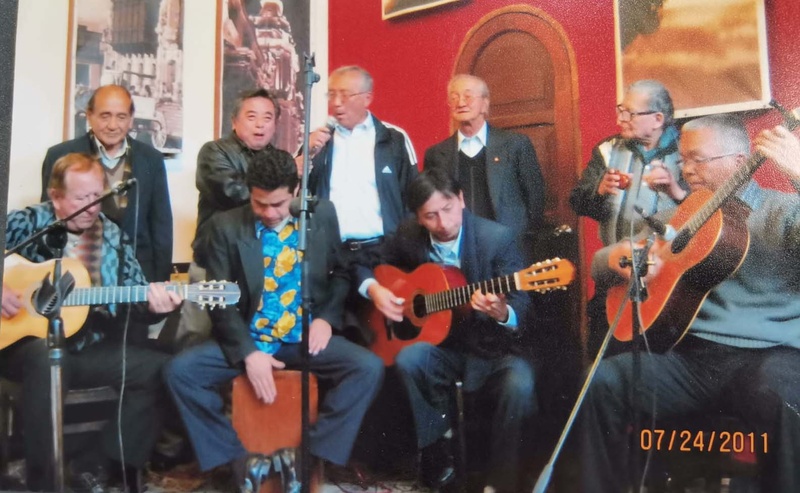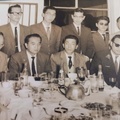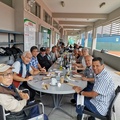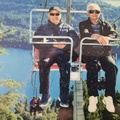Returning to my memories is thanking life on a journey of healthy happiness. It is feeling that the years that are gone always live palpitating at the end of a 'tie break' or accompanying me with the TV in a tennis match. My mind will always be between the bustle of my teammates and the memory of so many beautiful and charming players in AELU Tennis.
Music. The one that gravitated in the friendship of the nineties and at the beginning of this century. Listening to its musical notes simply brings back the faces and names of so many friends that today, playing music on WhatsApp fills the heart with energy and fills the mind with so many images that surround our memories. And I simply say to myself: “To return with a withered forehead, the snows of time silvered my temple.”
"Return". It will always be the word to repeat. And so many times, “Going back” is repeating the same language about the main passageway that leads to the first court. Find the large blackboard on the wall where we can put our card and fill the tennis fields filled with friendship with friends. Someone suggested to us one day to buy a musical device and we did it with the speed of a “double step”. And there, the memory of Dorita, Aniya and Vicky de Matsunaka fills us with pride and also with regret.
Dorita felt that Spanish dance had a vital importance in her life and many times with her musical charisma she suggested to us the dance of the “Seven Veils”. That which very sweetly made her husband, Julio Aniya, sleep. Or the dance that we loved Vicky with, to the music of Los Churumbeles from Spain, in a prayer for that musical collapse and only if the years were the beginning of an unfinished life.
The Creole waltz was the scroll of those years, having the guitar hanging on the wall was as if the answer was always on our side. The requinto of Lucho Fukushima and the vibration of Aurelio Nakasone with Diomedes Vargas, Fermín Uehara and JUAN 'El Chorri' Villaverde had that magic of putting the remembered waltz “El plebeyo” in that place where pisco and beer were pleasant company.
The theme was that, at the end of a doubles match, the sound of the vibrant strings broke the lethargy of a beautiful afternoon on the red courts of the AELU. There where every Saturday our friend Armando de Dios gave us, with a vibrant heart, the intimate parties on his portable piano or on his splendid accordion where the tango was often a repetition of returning to our childhood years and, unintentionally, feeling that Life was going “downhill” for us.
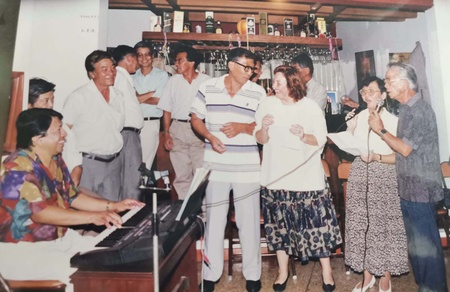
It was magic, they told us, when Pedrito Aritomi, soap in hand, entered the shower and let out his sonorous voice in repetition of a beautiful bolero. "Only one time". And, without a doubt, the composer Agustín Lara followed along on his elegant piano. That was at the end of their tennis match, and the main figure was throbbing with excitement between the hot water and the booming voice. From the shower he jumped to the microphones like a fish in water. And there in a duo, trio or quartet. The feeling of a huayno reminded us of his beloved Huancayo when, climbing memories and crying nostalgia, “Caminito de Huancayo” was the tap dance on a night of celebration that had just begun.
And the huayno, which was the anthem of our childhood and youth, sought to flourish in each stroke of our giddy racket. They said well that when the countrymen get together, the earth trembles, the harp accompanies us in the dream of a beautiful landscape. The lyrics of “El picaflor tarmeño” made Daniel Kuriyama and his friendly wife Olguita fill with pride. The Huancaíno roof was more populated on the grounds of our beloved Tenis AELU. Paquito Miyadi, Rosita de Mayeshiro, Pedrito Aritomi and, highlighting the Andean ravines of our “Peñas Creoles del café con leche”, Raúl Yshiyama. I, as the only Jaujino, trembled with emotion as I felt that the huayno “Jauja” was the constant repetition in every luxury of our songbook that I felt blooming every moment we met in the Hall of our AELU Tennis.
I never managed to learn the Japanese language, but I felt their songs in the beating of my blood through my veins. Don Richard Fukushima was the beloved teacher who, every afternoon he arrived at AELU Tennis, his first action was to insert his cassette into the musical device and “ Ame ni saku hana ” ushered us into our childhood and youth with the warmth of our hearts. parents and their friends. In those years, in the early nineties, several iseis accompanied us on the tennis courts. Don Saburo Hanawa, Ernesto Ychikawa and Naito San. All of them were the ones who left the imprints of their teachings on my beloved generation of tennis players.
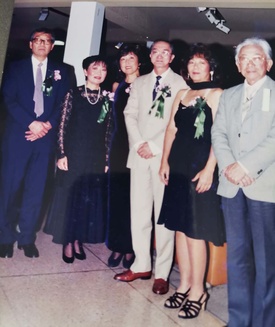
Without a doubt, we also visited the karaoke bars and Carlos Kembo Yagui, Aurelio Nakasone, Pedrito Aritomi, Memo Oka, Juan Kanashiro, Eduardo Oka, Carlos Tagami and Jorge Yano stood out there. Visits to those places were no less than twice a week and many times we were accompanied by the AELU tennis ladies, who showed us that singing was the greatest passion on nights with very clear moonlight. Rosita Kanashiro, Betty de Takeshita, Key de Agarie, Shino de Hiraoka, Isabel Moromi, Olguita de Kuriyama, Brunella Marcial, Nancy Galla, Rosita de Kanashiro, Nancy de Miyasato, Rosario de Takaesu, Jenny Taba, Silvia Muroya, Nancy de Sano, Michan from Fukuhara, Alicia Higa, Rosita from Yamashita and Mónica Toyama showed us that the songs had the passionate rhythm that life had given them: singing was a way to appease the moments that the physical state of sport had brought us down. Whoever grabbed the microphone made of it, the pleasant feeling of searching for the unforgettable moment with which each one experiences the music.
Accompany sport with the art of singing. It is a nice message to the new generations. Tennis nourishes the physical state of the person and singing makes the cloud of tranquility restore us for another day of work. Today, little by little, activities in all genres are returning. And life is that feeling that we must never lose. Sports, singing and friendship. It depends on each of us. And there we will be, like the sign turned on by a light when the music alters our thoughts and the voice is heard in the warm language of a remembered old song from our life.
© 2022 Luis Iguchi Iguchi


